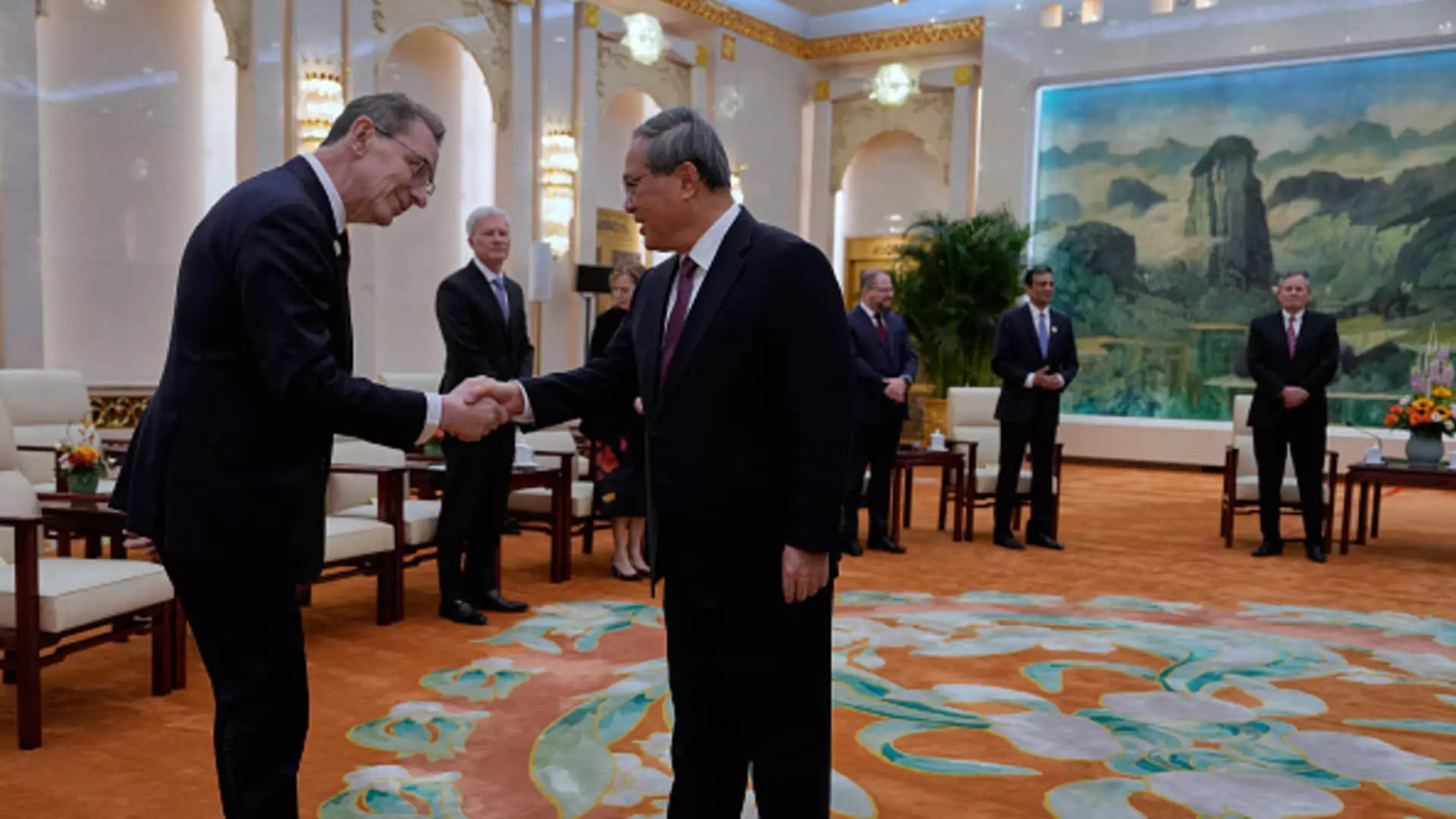The recent meeting between U.S. Republican Senator Steve Daines and Chinese Premier Li Qiang epitomizes a fascinating moment in the ongoing saga of U.S.-China relations. In a time where political tensions have escalated and economic dialogues seem stagnant, Daines’ visit represents a ray of hope—or perhaps a well-planned display of political chess. As the first American politician to visit China since the commencement of Donald Trump’s administration in January, Daines walks a tightrope between the ambitions of burgeoning business collaboration and the underlying realities of bilateral strain. Was this meeting an earnest attempt at dialogue, or merely a calculated political maneuver?
The presence of prominent executives from influential American firms such as Qualcomm, Pfizer, and Boeing at the meeting is not merely symbolic; it highlights the significant role of the private sector in shaping international relations. When business leaders gather with top government officials, the implications are profound. The stakes? Access to one of the world’s largest markets and the resolution of ongoing trade imbalances that threaten economic growth on both sides. Yet while some view this endeavor as a resounding opportunity for negotiation, others perceive it as a one-sided game in which the U.S. might sacrifice its bargaining power for mere platitudes.
Aiming for Stability: The Chinese Perspective
From Beijing’s perspective, the impetus to engage with Daines and his delegation is clear. China desperately needs to attract foreign investment amid mounting economic pressures aggravated by U.S. tariffs. The meeting occurs against the backdrop of a faltering domestic economy and escalating pressures for increased foreign capital flow. As Premier Li Qiang emphasized, “Our two sides need to choose dialogue over confrontation, win-win cooperation over zero-sum competition.” This statement encapsulates the Chinese desire for stability, urging American lawmakers to move past adversarial postures.
However, the hollowness of such appeals should not be overlooked. The call for dialogue often tips over into a form of coercive diplomacy, as Beijing attempts to frame its need for cooperation in a manner that casts the U.S. as the antagonist. As important as this dialogue may be, one cannot ignore the lingering skepticism about China’s commitment to genuine dialogue. Daines himself, previously involved in negotiations over U.S.-China trade under Trump, has experienced firsthand the complexities of navigating this relationship.
Role of Domestic Politics in Foreign Policy
Daines’ longstanding ties to both the Republican establishment and his personal history in China uniquely position him within this unfolding narrative. The senator’s experience as a former executive for Proctor & Gamble in China during the 1990s is notable; it underscores his dual identity as both an American politician and a businessman. This duality is advantageous but also raises questions about motives. Could Daines’ connections lead to more favorable outcomes for American businesses at the potential cost of holding China accountable for its human rights violations and trade malpractices?
In this context, we must scrutinize the role of domestic politics. Daines’ unwavering support for Trump paints him as a loyal member of a party that often adopts a hawkish stance toward China. This meeting may present an opportunity to soften rhetoric, but does it absolve the U.S. from addressing critical issues such as the fentanyl crisis? The senator’s social media posts reflect a profound tension as he walks the tightrope between facilitating positive dialogue and pressuring China to take responsibility for pressing international concerns.
The Illusion of High-Level Meetings
Meetings like the one between Daines and Li Qiang often create an illusion of progress, yet it’s crucial to approach these moments with a critical lens. The gathering lacked some traditional elements that made it into a significant event in the past—namely, the absence of a broader foreign CEO audience and the closed-door nature of the discussion with Li Qiang. It raises the question of whether this was merely a box-ticking exercise in a quest for stability or a meaningful effort to reconvene the high-level talks that have suffered in recent years.
Thus, while the intentions behind Daines’ visit might appear to be geared towards fostering goodwill and bipartisanship, one must remain vigilant. The stakes are high, and the line between dialogue and compromise can quickly blur. For those invested in a balanced and equitable foreign policy, the implications of this encounter are not just about business; they envelop the broader contours of geopolitics, national interests, and the ethical dimensions of international relations.


Leave a Reply